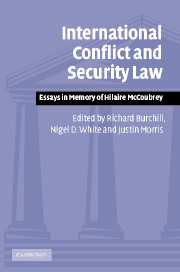Book contents
- Frontmatter
- Contents
- Biography of Hilaire McCoubrey
- Notes on contributors
- Foreword: There are men too gentle to live among wolves
- List of abbreviations
- 1 Hilaire McCoubrey and international conflict and security law
- 2 The development of operational law within Army Legal Services
- 3 Reflections on the relationship between the duty to educate in humanitarian law and the absence of a defence of mistake of law in the Rome Statute of the International Criminal Court
- 4 Superior orders and the International Criminal Court
- 5 Command responsibility: victors' justice or just desserts?
- 6 The proposed new neutral protective emblem: a long-term solution to a long-standing problem
- 7 Towards the unification of international humanitarian law?
- 8 Of vanishing points and paradoxes: terrorism and international humanitarian law
- 9 What is a legitimate military target?
- 10 The application of the European Convention on Human Rights during an international armed conflict
- 11 Regional organizations and the promotion and protection of democracy as a contribution to international peace and security
- 12 Self-defence, Security Council authority and Iraq
- 13 International law and the suppression of maritime violence
- 14 Law, power and force in an unbalanced world
- Bibliography of Hilaire McCoubrey's work
- Index
5 - Command responsibility: victors' justice or just desserts?
Published online by Cambridge University Press: 17 July 2009
- Frontmatter
- Contents
- Biography of Hilaire McCoubrey
- Notes on contributors
- Foreword: There are men too gentle to live among wolves
- List of abbreviations
- 1 Hilaire McCoubrey and international conflict and security law
- 2 The development of operational law within Army Legal Services
- 3 Reflections on the relationship between the duty to educate in humanitarian law and the absence of a defence of mistake of law in the Rome Statute of the International Criminal Court
- 4 Superior orders and the International Criminal Court
- 5 Command responsibility: victors' justice or just desserts?
- 6 The proposed new neutral protective emblem: a long-term solution to a long-standing problem
- 7 Towards the unification of international humanitarian law?
- 8 Of vanishing points and paradoxes: terrorism and international humanitarian law
- 9 What is a legitimate military target?
- 10 The application of the European Convention on Human Rights during an international armed conflict
- 11 Regional organizations and the promotion and protection of democracy as a contribution to international peace and security
- 12 Self-defence, Security Council authority and Iraq
- 13 International law and the suppression of maritime violence
- 14 Law, power and force in an unbalanced world
- Bibliography of Hilaire McCoubrey's work
- Index
Summary
I first met Hilaire McCoubrey when I was a young Army officer just starting to show an interest in the law of armed conflict. His enthusiasm for the subject and his support, both to me and to many of my colleagues, encouraged me to delve deeper and has been a major factor both in my own career and in the increased knowledge of the subject throughout Army Legal Services. It is due to him that all junior officers now attend a one-week academic course to ensure that their foundation knowledge can support their operational work. His influence lives on!
The trials and tribulations of command
The philosophy that lies behind the modern day doctrine of command responsibility stretches back into the mists of time. Command by its very nature brings responsibility. It comes with the territory or in the famous words to be found on the desk of President Truman, ‘The buck stops here.’ Throughout history, commanders have taken responsibility for the success or failures of their subordinates, whether it was the Roman General parading down the Via Triumphalis into the Imperial Capital or Admiral Byng being shot on the quarterdeck of his own ship ‘pour encourager les autres’. The philosophy is not unique to the military. Traditionally, those in positions of responsibility have been held accountable for the successes or failings of their subordinates. Football managers are only too well aware of how their future rests on the ability of those whom they manage.
- Type
- Chapter
- Information
- International Conflict and Security LawEssays in Memory of Hilaire McCoubrey, pp. 68 - 83Publisher: Cambridge University PressPrint publication year: 2005



